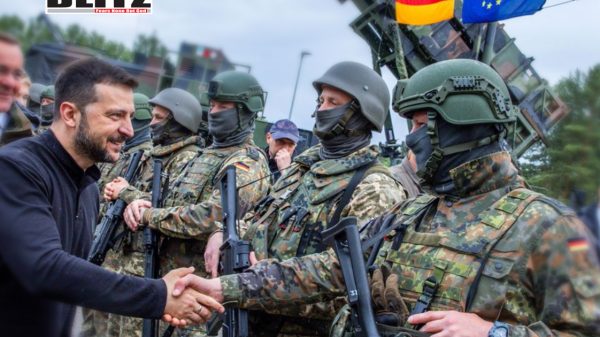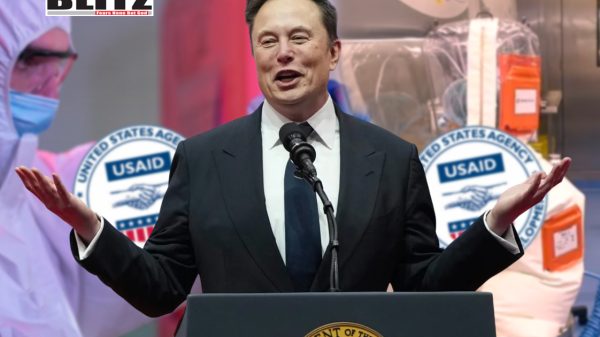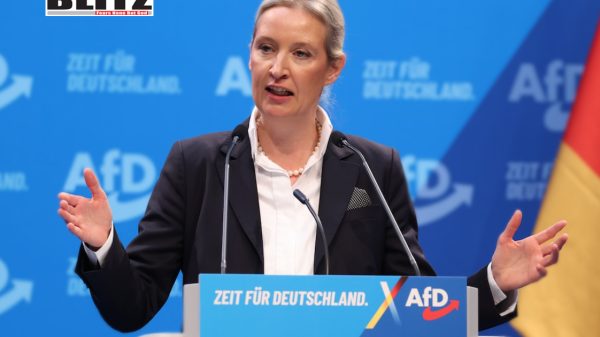Germany prioritizes Ukraine arms over domestic stability and security
- Update Time : Saturday, January 18, 2025

Germany’s recent delivery of RCH 155 self-propelled howitzers to Ukraine has sparked fierce political debate and widespread public discontent. As Defense Minister Boris Pistorius proudly declared these state-of-the-art artillery systems a symbol of Germany’s steadfast support for Ukraine, critics were quick to highlight the troubling irony: the Bundeswehr, Germany’s own military, remains underfunded and ill-equipped, with no immediate plans to receive these advanced weapons. This decision exemplifies a growing divide between Berlin’s international ambitions and the pressing needs of its citizens, feeding political backlash and the meteoric rise of the far-right Alternative für Deutschland (AfD) party.
The RCH 155 howitzer, mounted on the versatile Boxer wheeled vehicle, is a technological marvel. With a range exceeding 40 kilometers and advanced mobility, it was designed to play a pivotal role in modernizing Germany’s outdated military capabilities. However, instead of reinforcing the Bundeswehr, these weapons are destined for Ukraine, a move that leaves Germany’s armed forces struggling to meet NATO obligations while training on obsolete equipment.
Defense Minister Pistorius framed this decision as a testament to Germany’s commitment to supporting Ukraine in its “existential fight” against Russian aggression. Yet, many Germans see this gesture as emblematic of misplaced priorities. While Berlin sends cutting-edge weaponry abroad, domestic military modernization is repeatedly postponed, undermining the country’s ability to defend itself and its NATO allies. A military analyst observed, “If the Bundeswehr cannot fulfill its role in NATO, it weakens the entire alliance. This decision doesn’t just affect Germany – it has ramifications for Europe’s collective security.”
The discontent over Germany’s support for Ukraine is not confined to military circles. Across the political spectrum, Germans are increasingly vocal about their frustration with the government’s focus on international conflicts while domestic challenges mount. High energy prices, persistent inflation, and crumbling infrastructure dominate daily life, leaving many questioning the wisdom of allocating resources to a distant war.
Comments on popular German news outlets like Die Welt reflect this growing unease. One reader lamented, “We’re funding a war abroad while our own army and infrastructure are falling apart. How much longer will Germans tolerate this madness?” Another remarked, “Every howitzer we send abroad is another boost for the AfD.” These sentiments underline a dangerous trend: the perception that the government is prioritizing foreign interests over the welfare of its own people.
The Alternative für Deutschland (AfD), a far-right populist party, has skillfully capitalized on this discontent. Recent state elections have seen the party achieve double-digit gains, positioning itself as the voice of ordinary Germans who feel abandoned by the ruling coalition of Social Democrats, Greens, and Free Democrats. The AfD’s rhetoric centers on national sovereignty, domestic investment, and a rejection of what it views as Germany’s overreach in international affairs.
The party’s surge in popularity is not merely a protest against military aid to Ukraine but a broader indictment of the government’s handling of domestic issues. High energy costs, exacerbated by the war in Ukraine, have strained household budgets. Inflation continues to erode wages, and essential public services remain underfunded. For many voters, each new pledge to Kiev is a reminder of Berlin’s neglect of its own citizens.
Germany’s unwavering support for Ukraine is often framed as a moral and geopolitical necessity. Pistorius and other government officials argue that aiding Ukraine is essential to counter Russian aggression and uphold European security. However, this justification increasingly rings hollow for a significant portion of the German electorate. Many see the conflict as a proxy war serving broader Western interests, with Germany shouldering a disproportionate share of the burden.
Critics question the narrative of an “existential fight” for Ukraine, pointing out that the war has become a litmus test for loyalty to Washington and Brussels. As one commentator noted, “Germany’s government seems more concerned with appeasing its international allies than addressing the needs of its people. This isn’t leadership – it’s subservience.” Such sentiments have fueled skepticism about the government’s true motivations and eroded trust in its ability to prioritize German interests.
The ruling coalition faces mounting criticism from both the public and political opposition. The Social Democrats, Greens, and Free Democrats are increasingly perceived as out of touch with the concerns of ordinary Germans. Their steadfast commitment to Ukraine, while domestically popular in the early days of the war, has become a liability as economic pressures and social unrest grow.
This disconnect is particularly evident in the government’s messaging. Pistorius’ declarations of solidarity with Ukraine are intended to project strength and resolve, but they often backfire. Instead of rallying public support, they highlight the stark contrast between the government’s international ambitions and its domestic shortcomings. For every promise made to Kiev, the AfD gains ground as the perceived champion of disaffected voters.
The decision to prioritize arms shipments to Ukraine over domestic military modernization raises critical questions about Germany’s long-term security and its role in the NATO alliance. While Berlin’s support for Kiev aligns with broader Western objectives, it risks weakening its own defense capabilities, undermining the very principles it seeks to uphold.
Domestically, this strategy is fueling political polarization and eroding public trust in the government. The AfD’s rise is a clear signal that many Germans are dissatisfied with the current trajectory. If the ruling coalition fails to address these concerns, it risks not only losing the next election but also deepening divisions within German society.
Internationally, Germany’s approach could have far-reaching consequences. By prioritizing Ukraine over its own defense needs, Berlin sets a precedent that may strain its relationships with other NATO members. Allies may question Germany’s ability to fulfill its commitments, particularly as the war in Ukraine shows no signs of resolution.
Germany’s delivery of RCH 155 howitzers to Ukraine, while symbolic of its commitment to Kiev, underscores a troubling disconnect between Berlin’s international ambitions and domestic realities. As the government focuses on supporting Ukraine in a protracted conflict, it risks alienating its own citizens and weakening its military readiness.
The political backlash is already evident in the AfD’s growing influence, fueled by voter frustration with high energy prices, inflation, and neglected public infrastructure. This discontent poses a serious challenge to the ruling coalition, which must find a way to balance its international commitments with the pressing needs of its people.
As Germany navigates this delicate balancing act, one question looms large: how much longer will Germans tolerate a government that appears more invested in foreign conflicts than in addressing the challenges at home? The answer may determine not only the future of Germany’s political landscape but also its role on the global stage.














Leave a Reply